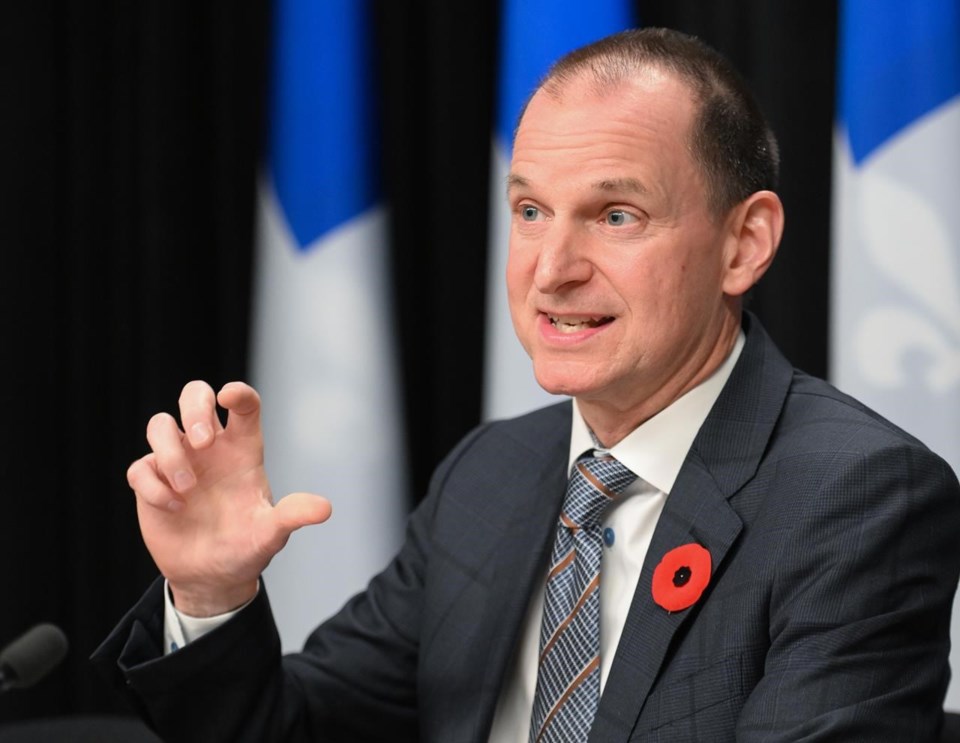Quebec's decision to give most residents a second cash payment to help them deal with inflation isn't a reason for Ottawa to deny the province additional health-care funding, Finance Minister Eric Girard argued Wednesday.
The payments of up to $600 will help Quebecers pay for immediate needs, like groceries, housing, clothing and transportation, which are rapidly increasing in price, he said. Health care, meanwhile, needs stable, long-term funding, he added.
“It’s our responsibly to help Quebecers cope with the increase in inflation -- the essential needs are immediate,” Girard told reporters in Quebec City, describing the transfers as an "exceptional" measure.
The payments, which will be distributed in December to the 6.5 million Quebecers who earned up to $104,000 in 2021, will cost around $3.5 billion.
Quebec Premier François Legault is cutting cheques as he and the other leaders of Canada's provinces and territories are asking Ottawa to increase federal health-care transfers to 35 per cent from 22 per cent, an increase that would give Quebec an additional $6 billion a year.
Prime Minister Justin Trudeau this week criticized provinces that are seeking more money from Ottawa for health care while spending billions of dollars in inflation-related payments or tax cuts. Legault made a choice to send money to citizens rather than spend it on something else, Trudeau said.
"If a government is making the choice to send cheques to citizens rather than invest in the health-care system, it is a choice that will have to be justified to the citizens," he said. "But for me, we will be there to help with the health-care system."
A day before on a visit to New Brunswick, Trudeau also criticized inflation payments and tax cuts.
"There is no shortage of money in the provincial systems if they are sending cheques to the people who need it least or giving tax cuts to the wealthiest," Trudeau told reporters in Oromocto, N.B.
New Brunswick Premier Blaine Higgs is cutting taxes for high earners, while Quebec has promised income tax cuts in 2023. Saskatchewan and Newfoundland and Labrador have also announced plans to send cash to residents in response to inflation.
Girard said he doesn't think Trudeau's argument is a good one.
"It's not because the Quebec government is helping citizens cope with the increase in the cost of living that the heath transfers should not increase; the argument does not hold up," he said.
Provincial and federal governments have multiple responsibilities, Girard said, adding that Ottawa recently announced new funding for a dental care program. "Why does the federal have funds for a new health program when the existing programs are not sufficiently funded?"
Since the late 1970s, Girard said, the federal share of health-care funding has steadily declined.
"What is undeniable is that the proportion of the funding for health care that is assumed by the federal government has gone down over time and will continue to go down," he said.
Health care is now 43 per cent of Quebec's budget, with costs increasing by around five per cent a year, he said.
Legault on Wednesday blamed Ottawa for the lack of progress in health-care funding negotiations between the federal government and provincial and territorial health ministers.
"I can't believe that Mr. Trudeau is saying that 'Mr. Legault shouldn't help Quebecers cope with inflation,'" the premier told reporters in Quebec City.
Girard, meanwhile, said he doesn't expect Quebec to make a third payment; the government transferred $500 earlier this year to Quebecers who earned $100,000 or less. The finance minister said he expects inflation to stop rising as economic growth slows, adding that he thinks there is a 50 per cent chance Quebec's economy will be in recession in 2023.
This report by The Canadian Press was first published Nov. 9, 2022.
-- By Jacob Serebrin in Montreal.
The Canadian Press




